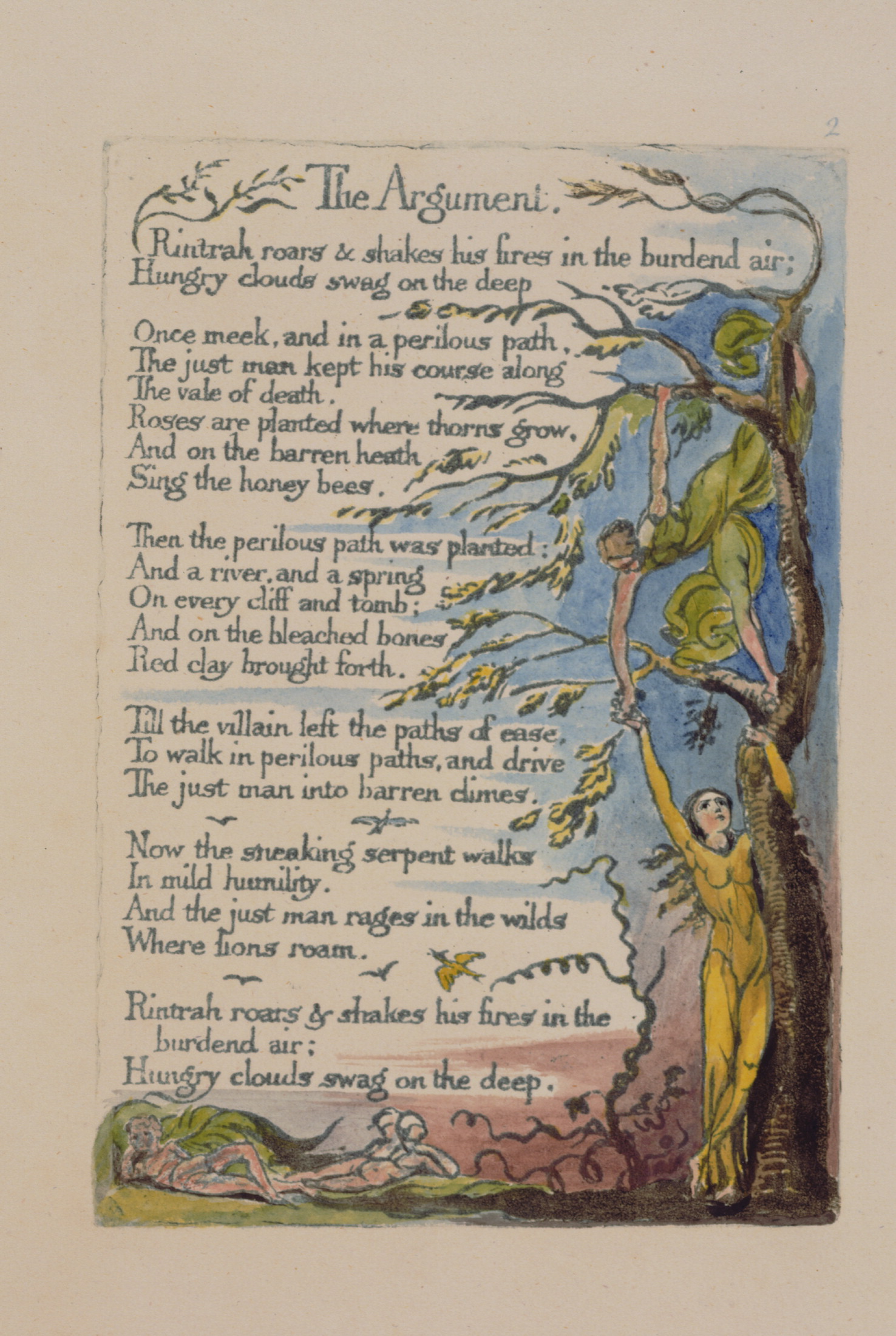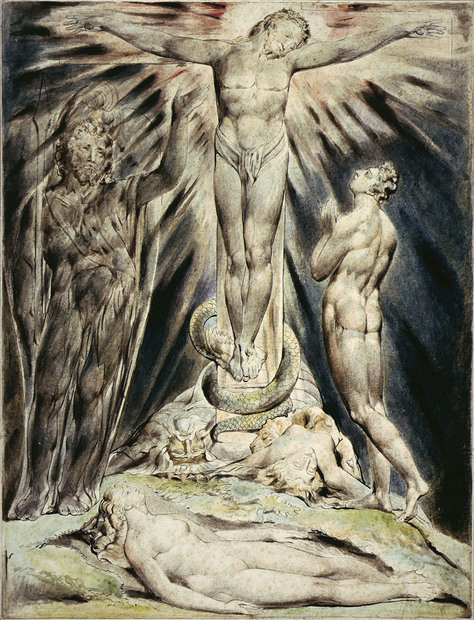Blake's Sources
Blake's Sources Although he was many other things, Blake might well be considered a "man of books". His reading was omnivorous. He might also be considered a Renaissance man if such a thing were possible in the 19th Century.
In The Sacred Wood T.S.Eliot wrote an essay on Blake. He found him lacking in the poetic tradition. Kenneth Rexroth wrote more excisively about Eliot's relation to Blake; he referred to Blake's sources as "the tradition of organized heterodoxy." And this from a lecture given by Kathleen Raine: "Blake's sources and reading proved to be not 'odds and ends' as T.S. Eliot had rather rashly described them. On the contrary, Blake's sources proved to be the mainstream of human wisdom. It was the culture of his age that was provincial, whereas Blake had access to the 'perennial philosophy', an excluded knowledge in the modern West in its pursuit of the natural sciences in the light of a materialist philosophy." Blake was not 'unlettered'! Quite the contrary he was a modern throwback to medievalism when 'it all' could be known; he knew all of which Eliot knew nothing. Bacon, Newton (and presumably Eliot) cared little for these cultures, but Blake included them in his 'library' of acquaintance. He despised Bacon and Newton as shallow materialists. in a Letter to Flaxman Blake wrote "Now my lot in the Heavens is this; Milton lovd me in childhood & shewd me his face, Ezra came with Isaiah the Prophet, but Shakespeare in riper years gave me his hand; Paracelsus & Behmen appeard to me." His "nodding acquaintance" was actually much, much broader. Here are some of the disciplines that Blake had at least a nodding acquaintance with: Some of Blake's Sources Swedenborg Homer Plato Plotinus Hermes Paracelsus Boehme Dante Shakespeare Milton Michaelangelo Bacon, Newton, and Locke Berkeley The Bible Swedenborg In the 18th century Emmanuel Swedenborg, the Swedish scientist, philosopher and religionist, had a very high reputation. In London a 'new church' sprang up espousing his values. William Blake's parents were members of the New Church. That probably explains several interesting things about Blake's early life. For example his father appear to be about as permissive as the average modern father in our culture today, but very atypical for his generation. . Blake was imbued with a great many of the famous man's values, particularly his esoteric religious ones. As a young adult Blake found many of the same ideas among the great thinkers of the ages. He became less dependent on Swedenborg's thought forms. With MHH Plates 21 and 22 he declared his independence of his childhood teacher. Perhaps the chief objection of the mature Blake was that Swedenborg had a positive demeanour re the established church: O Swedenborg! strongest of men, the Samson shorn by the Churches; Showing the Transgressors in Hell, the proud Warriors in Heaven, Heaven as a Punisher, and Hell as One under Punishment; With Laws from Plato and his Greeks to renew the Trojan Gods In Albion, and to deny the value of the Saviour's blood. The reader no doubt recalls that Samson was shorn of his locks by Delilah, leading to the loss of his unusual strength. But one of the things that stayed with Blake was Swedenborg's concept of the Divine Humanity . To Tirzah (K 220) was a concise summary of Swedenborg's teaching (Golgonooza page 96.) A Vision of the Last Judgment, page 84: Around the Throne Heaven is opend & the Nature of Eternal Things Displayd All Springing from the Divine Humanity Although Blake owed much to Michaelangelo, his Vision of the Last Judgment was more closely related to Swedenborg's; Michaelangelo' picture had an exoteric orientation, while that of Swedenborg and Blake had a mystical one. To put it otherwise the great Italian painter suggested a material event some time in the future, while the other two concerned spiritual rather than material realities. Swedenborg and Blake, but not Michaelangelo, perceived the Last Judgment as an end and a beginning, or a death and rebirth (of individuals, nations, and the world). Swedenburg has another very significant contribution to the thought forms of Blake in what they both referred to as states. A state is a condition through which a person travels in his journey through life. One can also recognize a close correspondence between Swedenborg and Blake relative to an inveterate hostility toward the established church (cfWilliam Blake and the Radical Swedenborgians page 99). Swedenburg taught that there had been 27 churches, those of Adam, Noah, Abraham, Solomon...Paul, Constantine,Charlemayne and Luther. Blake substantially agreed with that: Distinguish therefore States from Individuals in those States. States Change: but Individual Identities never change nor cease: You cannot go to Eternal Death in that which can never Die. Satan & Adam are States Created into Twenty-seven Churches. (Milton 32:22-25 erd 321) The first ones were Adam, Seth..., and the last one as I recall was Luther. After which the same old round began again to repeat itself in the Great Year, a depressing form of church history. Neither Blake nor Swedenborg thought much of the organized church. The latter thought that it had passed out, to be replaced by a new church in the New Age. He dated it at 1757, the year of Blake's birth as it happened. According to Raine it was "Swedenburg whose leading doctrine Blake summarized in the Everlasting Gospel". But this is a very difficult poem; not really a poem but intermittent snatches of poetic thought. Very hard to understand because Blake's mood and tone modulates continually, sometimes ironic, sometimes not. It's a source book for whatever gems speak to you. (See also Chapter 7.) It does indicate rather clearly Blake's (and Swedenborg's) view about the organized church and conventional theology. Homer: The primary source of the Cave of the Nymphs is certainly Homer's Odyssey, while the Myth of Persephone stems of course from the Iliad.. "Then I came upon a marvellous clue in the works of Thomas Taylor the platonist, whose translations of the complete works of Plato, most of Plotinus, Proclus and the other Neoplatonic writings of the third century A.D were appearing contemporaneously with Blake's works." (from a lecture in India of Kathleen Raine re her initial search for Blake's sources) Taylor and Blake were almost the same age. Taylor, with his translations of Greek philosophy turned Blake's interest in this direction and led to his use of many of them in his search for symbolic material. Blake also used a great variety of 'spiritual' documents beginning before Plato and stretching down to his own day. Some of the writers were: Plato's Myth of the Cave can be seen as the locale of Visions of the Daughters of Albion. Here is the poetry. Here is a short introduction to Plato's philosophy; it closely parallels Blake's myth. Plotinus: Platonism, neoPlatonism- Blake may have been more of the latter than the former. He used Thomas Taylor's translations extensively in his mythmaking. (If you're up for reading it, here's a colorful description of the man's life. Blake in particular depended heavily upon Taylor's Dissertation on the Eleusinian and Bacchic Mysteries. Hermes Trismegistus: Wikipedia offers a useful introduction to this mythic figure. Blake included the Hermetic writings in his library and made use of them in his own creations. (Hermes Trismegistus has an introduction to this material.) The Divine Poemander was perhaps the most important of many works. In Jerusalem plate 91 Blake mentioned the Smaragdine Table of Hermes as the baleful influence on one of his failing characters. He endorsed Proposition 2: "What is below is like that which is above, and what is above is like that which is below, to accomplish the miracles of the one thing." but felt that Hermes was a magician trying to pass as a mystic. (Magicians try to pull the beyond down to the material, while mystics have visions of the Beyond.) Paracelsus introduced Blake to the rich symbolic language of astrology. Boehme's Divine Vision not only figured largely in Blake's works, but expressed most aptly his personal approach to creativity. Boehme provided one of many sources for Blake's doctrine of the descent (or fall) of Albion (man): "The one only element fell into a division of four.. and that is the heavy fall of Adam...for the principle of the outward world passeth away and goeth into ether and the four elements into one again, and God is manifested. Blake expressed "the division of four" of course with the Four Zoas. (Percival p 19). The divided four represent the principalities against which Paul wrestled (as he wrote in Ephesians 6:12). Blake illustrated Dante's Divine Comedy (Many of these pictures are onlinehere). |



